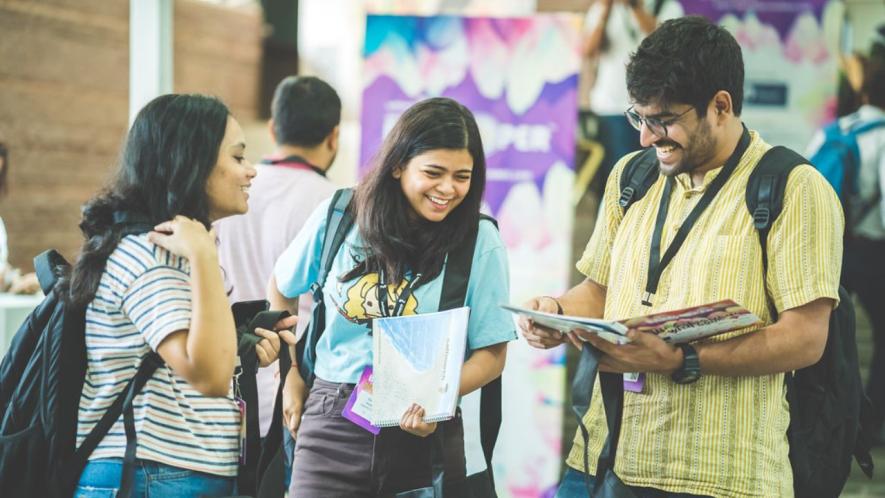Bengal: MM, ‘Mango’ and a Thriving Threat Culture in Colleges

Representational Image. Image Courtesy: Flickr
“I control goondas”, Mamata Banerjee had hollered from a campaign stage before coming to power in 2011 in West Bengal.
Was it a slip of the tongue, said at a time when the campaign was at its peak and heated exchanges between political parties is normal, or was it something that slipped out at a moment of bursting excitement? A truth buried deep inside?
The juggernaut of incidents that kept rolling one after another after her ascension to the chair of the Chief Minister tells us that what she had said, may have been at the heat of the moment, but proving to be 100% true.
Banerjee herself went on to prove that what she said was true soon after becoming Chief Minister, when she stormed into the Bhowanipur Police Station to free hoodlums belonging to her party. The men were picked up by the police for creating nuisance during the immersion of the Jagadhatri idol. (Kolkata Police had still not gotten over the practice of acting on their own in case of any untoward incident, as they were used to during the Left Front government. Ever since, of course, they reportedly do not lift a finger until they get explicit instructions from the highest stratum of the administration.)
Ever since, such incidents have been unrelenting, each more vicious than the previous one. In January 2012, the principal and a professor of Raiganj University College in North Dinajpur were beaten up with cricket stumps and iron rods by a students’ group backed by Trinamool Congress. The Chief Minister responded by saying it was a “minor incident” and accused the CPI(M) and Congress of making “a mountain of a molehill”. She also blamed the principal for favouring “one side” and also alleged that “a section of officers in charge of police stations were CPM agents”.
A few days later, the principal was gheraoed by the students belonging to TMCP (Trinamool Congress Chhatra Parishad), who barged into his room, shouted at him and banged on his table angrily. After a while, the principal fell unconscious and had to be hospitalised. The local TMC MLA was quoted in the media, accusing the principal of “resorting to dramatics in a pre-planned manner.”
Instead of condemning the incident, TMC Minister Firhad Hakim was quoted as saying, “It is being noticed that some principals are still obsessed with their political ideology. I would request them to run colleges impartially and keep their political ideology at home. They should realise that change has taken place in the state.”
In another incident in 2012, Arabul Islam, a TMC strongman and then a member of the governing body of Bhangar College, barged into the staff room with his ‘lackeys’ and got into a heated argument with one of the women professors. He then reportedly threw a water jug at her, injuring her chin.
After such incidents of attacks on professors and principals of colleges, when asked by journalists to respond on this issue, then Education Minister, Bratya Basu, had reportedly said, “Who are being attacked? They are getting the pride of TV serial actors, mind it, and the media has given it”.
The fallout of the comments made by the Chief Minister and her ministers, way back in 2012, set the stage for rowdyism in educational institutions. Gradually these ‘rowdies’ graduated to embezzlement of funds, extortion as well as sextortion.
Another pertinent reason for the rising ‘roguery’ of TMCP was engineered by Chief Minister Mamata Banerjee – by not holding student union elections in colleges and universities since 2017. The supremacy of TMCP increased manifold, giving them a playground with no opposition.
This was a well thought out strategy by Banerjee. On the one hand, it helped her in keeping TMCP satisfied with unbridled power, while on the other, it helped her in inducting ‘new blood’ into her party. With no other political party-backed student organisations present in the campus, TMCP had the advantage of inducting young students into their party, most of the times forcefully.
The recent incident that has set off tremors in West Bengal is the rape of a woman student inside the premises of the South Kolkata Law College. And like the ripple effect of an earthquake, everyday new and more startling, scary, disquieting reports about the main accused are stumbling out. Each day is a revelation of the rot that has seeped into the education system of West Bengal. A degeneration that is centrally controlled and meticulously organised and institutionalised.
Who is this main accused? Who is MM? Who is Mango? The main accused also known as MM and Mango is Monojit Mishra. Who is Monojit Mishra? The answer is at once fear-provoking and thought-provoking.
This man, the key accused, is said to be an extremely powerful and influential TMC member who is apparently close to all top leaders of the ruling party.
As per reports, ‘MM’ joined South Kolkata Law College as a student in 2012 and in 2013 he allegedly stabbed a youth in his chest at Kalighat Temple locality. An FIR (No.1) was lodged. He went into hiding. For years he was absconding and re-surfaced in 2017 in the city and took admission for the second time at the South Kolkata Law College. A purported photograph of MM has gone viral on various social media platforms which shows him with Abhishek Banerjee, Mamata Banerjee’s nephew and three times Member of Parliament from Diamond Harbour. Trinankur Bhattacharya, state president of TMCP, claimed in an interview that that photograph was taken in 2017. The question being raised is: why did Abhishek Banerjee, ‘heir apparent’ of the Chief Minister, agree to meet a man who had been absconding for four years after stabbing a youth?
Immediately after taking admission for the second time, Mishra had allegedly got involved in hooliganism inside the college premises. The Gariahat Police Station lodged an FIR (No.2) against him but did not arrest him. Why? Was it because of the clout he enjoyed? Whatever be the reason, he remained beyond the jurisdiction of the police.
This emboldened ‘Mango’ and in 2022, and FIR no. 3 was filed against Mishra for sexually molesting a girl student. No, the police did not even touch him. Would the police have remained so blasé about Mishra if he did not have the overt support of TMC’s top leaders?
Besides the three FIRs, ‘Mango’ has countless complaints lodged against him for extortion, threats, sexual assaults, tussles and clashes. But both the college administration and the police administration remained unfazed. Why? Was he so indispensable for TMC that they overlooked his predilection for sexual depravity?
A little digging, and out tumbled the can of worms that has been plaguing the state education system since 2011, when TMC came to power. Everything led to money, unaccounted money… money power.
This is how the modus operandi operated.
Calcutta University has 2,166 seats that are distributed amongst 14 law colleges. In order to get admitted, one has to clear the Calcutta University Law Entrance (CULE) exam. A huge number of students take this exam and step by step, a merit list is published. Apparently, so far there is no trace of any unlawful activity. In reality, of course, the scenario is different. At least 10 seats in each college have allegedly been set aside to be “sold” to candidates placed at the bottom of the merit list. These students then approach TMC leaders, who would then send their “recommendations” to Mishra who would allegedly get these students admitted in exchange of huge sums of money. The rate for admission would customarily depend on the location of the college in Kolkata, it is said. For some colleges the rate was Rs 5 lakh, while for some others it was much higher.
These “recommendations” would come from top leaders of the ruling TMC. Since top leaders were involved, no university would object at the time of registration.
Institutional corruption was allegedly not limited to admission. It extended to cultural programmes, popularly known as College Fests. It has been alleged that there is no record about the amount collected for the fests nor are there any records of the amount spent. But it can safely be said that the amount ran into a few lakhs.
The extent of the clout that Mishra enjoyed can be imagined, as he reportedly had access to CCTV footage of the college on his phone. Beating up students who opposed him was apparently a regular affair, it has been alleged. In a purported video on social media, one can hear Mishra saying that he is a ‘professional criminal’. Even the Kolkata Police has stated in the court that ‘Mango’ was “very influential”. His Call Record Details (CRD) reveal his connections with top TMC ministers.
With the Pandora’s Box slit open, new incidents of TMCP’s ‘dadagiri’ are spilling out. Almost all colleges apparently have a ‘Monojit Mishra’ in their campus --someone who has long ago passed out but still rules the roost, and controls everything from admission to recruitment. Even college principals have to abide by what these dadas say.
All these incidents prove beyond doubt how corruption, and threat culture has been institutionalised in the educational institutions in West Bengal. These extra-constitutional bodies and personnel work like organised gangs that are centrally controlled by one or more than one person who remain/s behind the curtain, just like villains of Hindi popular movies of the 70s.
The legacy media is desperately trying to portray this whole miasmic episode as the ‘Monojit Model’ and trivialise the institutional corruption, goondaism and breakdown of democracy. MM and the likes of him are mere pawns controlled by powerful politicians to their bidding. This is actually a blueprint designed to look like ‘stray incidents’ when in reality these are plans to play havoc with the education system so as to force students towards private colleges and universities. The state government is looking to privatise education and absolve itself of all responsibilities.
The author is a Kolkata-based content writer and activist. The views are personal.
Get the latest reports & analysis with people's perspective on Protests, movements & deep analytical videos, discussions of the current affairs in your Telegram app. Subscribe to NewsClick's Telegram channel & get Real-Time updates on stories, as they get published on our website.
























